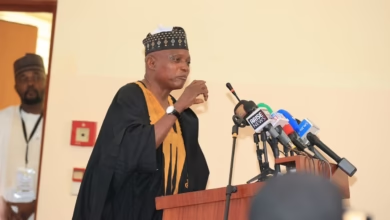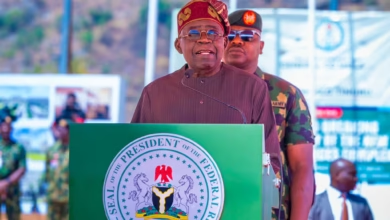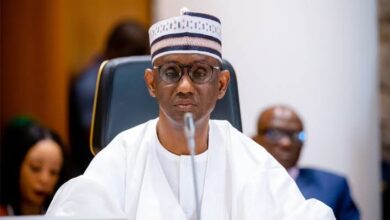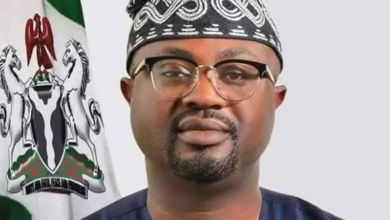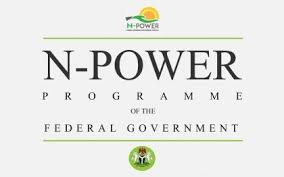
DESPITE the devious plans of critics to discredit the programme, the Buhari administration’s National Social Investment Programme is, by a large stretch, so far a successful story. It is driven by a team determined to improve the livelihood and welfare of millions of Nigerians nationwide.
However, for critics, like Dele Sobowale, who have in the past based their criticisms on falsehood and alternative facts, they are first to jump on the bandwagon of headlines that erroneously try to paint the NSIP in negative light.
When some sections of the media carried the misleading story claiming that the “N1trn Govt Social Investment Programme Marred by Fraud, Corruption,” it was obvious that the reporters, sadly, had twisted the statements attributed to the Special Adviser to the President on Social Investments, Mrs. Maryam Uwais.
The National Social Investment Office (NSIO) under the Office of the Vice President, Prof Yemi Osinbajo, SAN, has indeed been recording significant successes across the States where they have been deployed.
To choose to be ignorant is worse than being ignorant unwittingly. As the SIP continues to record more gains, some commentators are more interested in creating an illusion rather than reflect the reality. It is dangerous and unpatriotic to allow individuals like that to present ignorance as facts and falsehood as gospel truth. Mr. Dele Sobowale and his ilk are urged to take note that comments are free but facts are sacred.
Kick-off of the payment
On January 2, 2017, the President Muhammadu Buhari administration announced the kick-off of the payment of N5,000 each to one million Nigerians living in abject poverty under its Conditional Cash Transfer programme.
The scheme is part of the Social Investment Programme that included the payment of N30,000 monthly stipends to 200,000 youths under the N-Power initiative (which began in December 2016), and the school feeding programme.
The first batch of payment of the N5,000 began with nine states with beneficiaries already receiving the stipends as of December 30, 2016 – even though some cynics claimed to have travelled to the nine states in January 2017 without finding one “official” indigent beneficiary, when payments to beneficiaries in Borno, Kwara and Bauchi states had been released in the fall of December to the Nigeria Inter-Bank Settlement System, the platform that hosts and validates payments for all government’s SIP.
Then, the funds for another set, which included Cross Rivers, Niger, Kogi, Oyo, Ogun and Ekiti states, followed to complete the first batch of beneficiaries. The nine pilot states were chosen because they had an existing social register that successfully identified the most vulnerable and poorest Nigerians.
All the funds approved for the SIP are domiciled in the Ministry of Budget and National Planning, and not with the Vice President or his spokesperson, Mr. Laolu Akande, as some cynics want the public to believe. In addition, the payment information and processes for all beneficiaries of the programme are hosted at NIBSS, as the Consolidated Beneficiary Register. This is to ensure and fortify efforts at the authentication and verification, as well as for effective management of the initiative.
As of today, NSIPs have recorded 7.9 million direct beneficiaries since inception and have a presence in the 36 states of the Federation and Federal Capital Territory.
Starting with the Npower initiative, about 200,000 graduate beneficiaries are enrolled and working in various institutions in the country. The selection of the next batch of 300,000 beneficiaries has been completed and those selected will be engaged soon; 20,000 more beneficiaries in the non-graduate category are set to commence training in 34 states.
Also, 259,541 (GEEP) beneficiaries belonging to 4,784 cooperatives have been paid in all states and the FCT; and the next batch of 148,611 loans has been approved for disbursement.
A total of 2,495 community facilitators have been trained, whose responsibility it is to engage the caregivers in the households being paid, facilitate the forming of cooperatives, basic financial training, skills and support.
Concerning the school feeding programme, it is on record that at least 7,054,687 children in primary 1 to 3 are being fed daily in 21 states. In driving the feeding programme, the government hired and empowered 72,510 cooks in the 53,541 schools being serviced.
Over 246 million (246,355,190) meals has been served to date to primary pupils in at least 20 states, since the first meal was served in December 2016. The total figure is expected to reach 313,928,420 meals by the last week of February this year.
At least 6,044,625 pupils in 33,981 public primary schools across 20 states are fed. More states are expected to be added to the programme this year. The NHGSFP plans to implement feeding in a total of 28 states as it also aims to link farmers to school feeding markets.
Impact of the programme
I know several persons that have been beneficiary of each of the programmes. I have friends who told me how their relatives applied for N-power and got it without going through any connection. Personally, I know a few. What about the school feeding programme, I can go on and on with teachers that I have encountered in some of these states talking about how impactful the programme is in their respective schools.
It doesn’t matter whether one likes President Buhari and VP Osinbajo or not, several milestones were recorded in the NSIP in 2017 in terms of tackling poverty, hunger, and creating jobs. About 40,000 direct jobs were created from the school feeding programme; and in collaboration with the Federal Ministry of Health a de-worming programme was initiated for pupils in all public primary schools from classes 1 to 6 in 17 states.
For the records, the SIP is not hampered by widespread corruption, as some
misleading reports in some sections of the media had insinuated.
Holding power to account doesn’t mean the media should be a killjoy. Making the government accountable isn’t the same thing as being a party-pooper like Sobowale and his ilk. Journalism must be practised responsibly.
If you don’t support a responsible government, irresponsible people will want to have their say and their way. Kick against sensationalism; kick against fake news purveyors, and kick against fraudulent opinion leaders lurking on pages of national newspapers.
By Peta D. Tar
A social entrepreneur writes from Benue.

